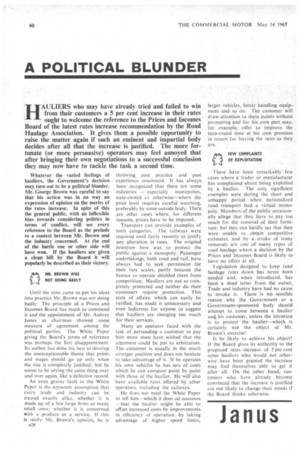A POLITICAL BLUNDER
Page 62

If you've noticed an error in this article please click here to report it so we can fix it.
HAULIERS who may have already tried and failed to win from their customers a 5 per cent increase in their rates ought to welcome the reference to the Prices and Incomes Board of the latest rates increase recommendation by the'Road Haulage Association. It gives them a possible opportunity to raise the matter again if such an eminent and impartial body decides after all that the increase is justified. The more fortunate (or more persuasive) operators may feel annoyed that after bringing their own negotiations to a successful conclusion they may now have to tackle the task a second time.
Whatever the varied feelings of hauliers, the Government's decision may turn out to be a political blunder. Mr. George Brown was careful to say that his action was in no way an expression of opinion on the merits of the rates increase. In spite of this the general public, with an inflexible bias towards considering politics in terms of conflict, will see every reference to the Board as the prelude to a contest between Mr. Brown and the industry concerned. At the end of the battle one or other side will have won. If the hauliers are given a clean bill by the Board it will popularly be described as their victory.
MR. BROWN WAS NOT DOING BADLY
Until the time came to put his ideas into practice Mr. Brown was not doing badly. The principle of a Prices and Incomes Board has much to commend it and the appointment of Mr. Aubrey Jones as chairman showed sonic measure of agreement among the political parties. The White Paper giving the Board's terms of reference was perhaps the first disappointment. Its author has done his best to develop the unexceptionable theme that prices and wages should go up only when the rise is completely justified; but he seems to be saying the same thing over and over again, like a defective record.
An even graver fault in the White Paper is the apparent assumption that every trade and industry can be treated exactly alike, whether it is made up of a few large firms or many small ones; whether it is concerned with a produce or a service. If this is really Mr. Brown's opinion, he is a28
throwing past practice and past experience overboard. It has always been recognized that there are some industries — especially monopolies, state-owned or otherwise—Where the price level requires careful watching, preferably by some outside body. There .a.rc other cases where, for different reasons, prices have to be imposed.
Transport can provide examples of both categories. -The railways were required until fairly recently to justify any alteration in rates. The original intention here, was to protect the public against a monopoly. Passenger undertakings, both road and tail, have always had to seek . permission for their fare scales, partly because the licence to operate shielded them from competition. Hauliers are not so completely protected and neither do their customers require protection. This state of affairs, which can easily be verified, has made it unnecessary and even ludicrous for anyone to suggest that hauliers are charging too much for their services.
Many an operator faced with the task of persuading a customer to pay him more must have wished that the argument could be put to arbitration. The customer is usually in the much stronger position and does not hesitate to take advantage of it.If he operates his own vehicles he has sets of costs which he can compare point by point with those of the haulier. He will also have available rates offered by other operators. including the railways.
He does not need the White Paper to tell him—which it does ad nauseam —that the haulier might be able to offset increased costs by improvements in efficiency of operation, by taking advantage of higher speed limits, larger vehicles, better handling couipment and so on. The customer will draw attention to these points without prompting and for his own part may, for example, offer to improve the turn-round time at his own premises in return 'for leaving the rates-as they are.
FEW COMPLAINTS OF EXPLOITATION
There have been remarkably few, cases where a trader Or manufacturer has complained about being exploited by a haulier. 1 The only significant examples were during the short' and , unhappy Period when nationalized road transport had a Virtual monopoly. Members of the public occasionally allege that they have to pay too much for the removaL of their furniture; but they can hardly: say that they were unable to obtain.. competitive estimates, and by a .stroke of irony removals are one of many types of road haulage where a decision by the Prices and Incomes Board is likely to have no effect at all.
Legislation designed to -keep road haulage fates down has never been needed and, when introduced, has been a dead letter from the outset. Trade and industry have had no cause to invoke it. . There is no -sensible reason why the Government or a Government-sponsored body should attempt to come between a haulier an his customer, unless the intention is to protect the haulier—which is certainly not the object of Mr. Brown's exercise!
Is he likely to achieve his object? If the Board gives its authority to the proposed rates increase of 5 per cent some hauliers who would not otherwise have been granted the increase may find themselves able to get it after all. On . the 'other hand, customers who have already become convinced that the increase is justified are not likely to change their minds if the Board thinks otherwise.
Janus




















































































































